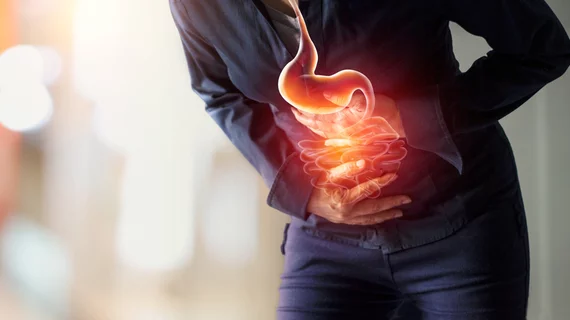Radiologists must be aware of key CT findings in patients with 'devastating' COVID complication
Though acute mesenteric ischemia isn't commonly diagnosed among COVID patients, it can have deadly consequences when not caught early. This week in Abdominal Radiology, researchers highlight findings on abdominal CTs that could aid in a swift diagnosis.
“It is imperative that the radiologists and clinicians are familiar with the imaging manifestations of AMI in COVID-19 on CT, so that they can make informed decision regarding management and improve outcomes in this devastating condition,” Vineeta Ojha, MD with the Department of Cardiovascular Radiology & Endovascular Interventions at All India Institute of Medical Sciences and Avinash Mani, MD with the Department of Cardiology, Sri Chitra Tirunal Institute for Medical Sciences and Technology, and co-authors wrote.
For the research, a total of 47 studies on 75 patients were reviewed. All were confirmed to have COVID, as well as acute mesenteric ischemia (AMI) diagnosed via surgery, imaging or biopsy. Each patient selected had at least one contrast-enhanced abdominal CT scan.
The most common CT finding proved to be small bowel ischemia (46.7% of cases), followed by ischemic colitis (37.3%). In terms of bowel movement involvement, non-occlusive mesenteric ischemia was most frequently noted (67.9%). Other recurrent findings included bowel wall thickening, as well as superior mesenteric vein and superior mesenteric artery (14.3% and 24.9%, respectively) association. Findings in laparotomy and histopathology corroborated the diagnoses.
The outcomes for COVID patients diagnosed with AMI were most concerning, the authors noted. When treated conservatively and without surgery almost half (24/56) of these patients died. Those who underwent surgery fared better, but still had an overall mortality rate of 30%.
“The mortality in patients with AMI depends upon the time to diagnosis and initiation of the management,” the authors wrote. They also stressed the importance of using contrast-enhanced CT scans as the standard tool in diagnosing AMI at early onset.
The study implies the urgency of not just the timing when diagnosing AMI but also the need for radiologists to be aware of these specific CT findings.
You can read the detailed study in Abdominal Radiology.

